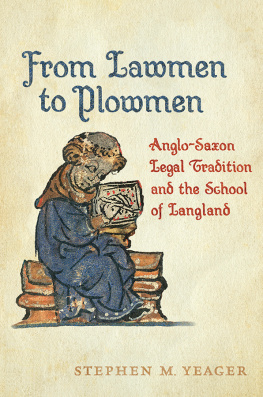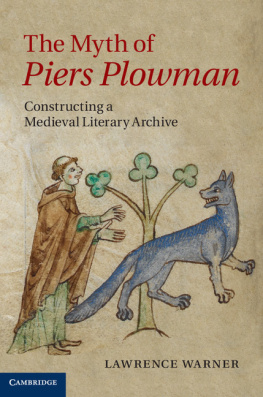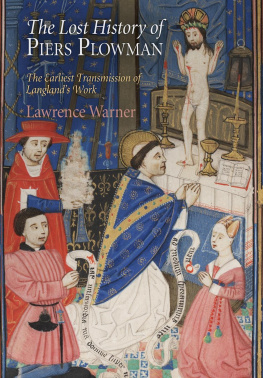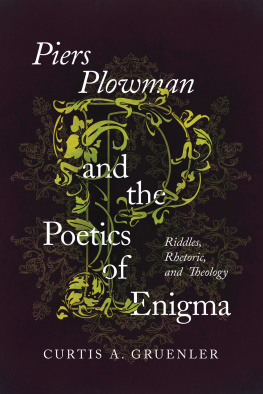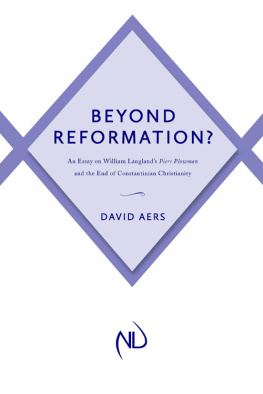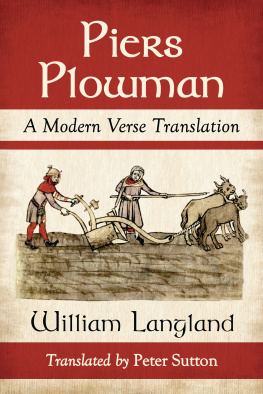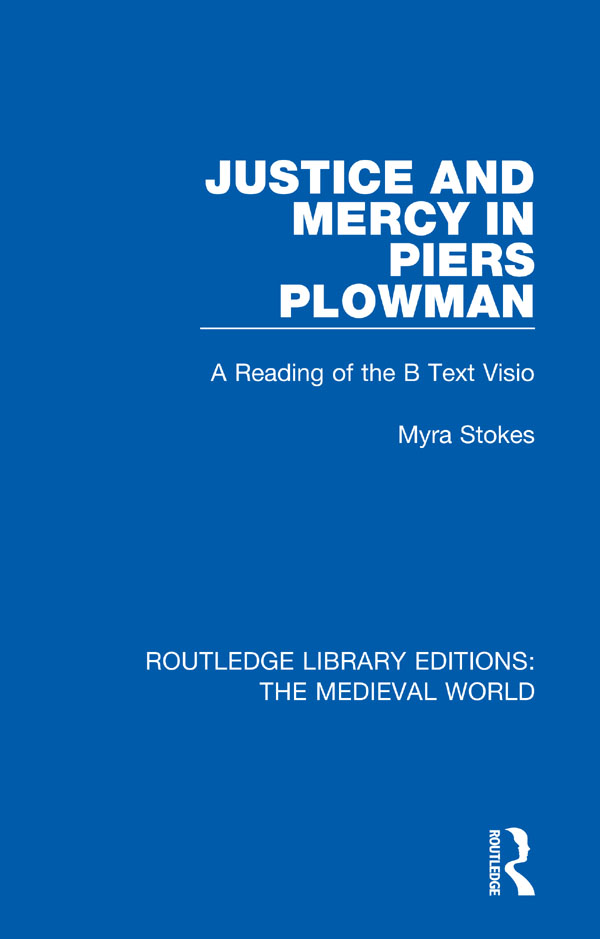Contents
Landmarks
ROUTLEDGE LIBRARY EDITIONS: THE MEDIEVAL WORLD
Volume 51
JUSTICE AND MERCY IN PIERS PLOWMAN
JUSTICE AND MERCY IN PIERS PLOWMAN
A Reading of the B Text Visio
MYRA STOKES

First published in 1984 by Croom Helm Ltd
This edition first published in 2020
by Routledge
2 Park Square, Milton Park, Abingdon, Oxon OX14 4RN
and by Routledge
52 Vanderbilt Avenue, New York, NY 10017
Routledge is an imprint of the Taylor & Francis Group, an informa business
1984 Myra Stokes
All rights reserved. No part of this book may be reprinted or reproduced or utilised in any form or by any electronic, mechanical, or other means, now known or hereafter invented, including photocopying and recording, or in any information storage or retrieval system, without permission in writing from the publishers.
Trademark notice: Product or corporate names may be trademarks or registered trademarks, and are used only for identification and explanation without intent to infringe.
British Library Cataloguing in Publication Data
A catalogue record for this book is available from the British Library
ISBN: 978-0-367-22090-7 (Set)
ISBN: 978-0-429-27322-3 (Set) (ebk)
ISBN: 978-0-367-18465-0 (Volume 51) (hbk)
ISBN: 978-0-429-19646-1 (Volume 51) (ebk)
Publishers Note
The publisher has gone to great lengths to ensure the quality of this reprint but points out that some imperfections in the original copies may be apparent.
Disclaimer
The publisher has made every effort to trace copyright holders and would welcome correspondence from those they have been unable to trace.
Justice and Mercy in Piers Plowman
A Reading of the B Text Visio
MYRA STOKES

1984 Myra Stokes
Croom Helm Ltd, Provident House, Burrell Row, Beckenham, Kent BR3 1AT
Croom Helm Australia, PO Box 391, Manuka, ACT 2603, Australia
British Library Cataloguing in Publication Data
Stokes, Myra
Justice and mercy in Piers Plowman.
1. Langland, William. Piers Plowman.
I. Title
821.1 PR2015
ISBN 0-7099-2354-6
Printed in Great Britain by Biddies Ltd, Guildford, Surrey
CONTENTS
ACKNOWLEDGEMENTS
To the labours of past and present editors of Piers Plowman, who have done so much to make this long and difficult poem accessible to the would-be literary critic, I naturally owe more than the foot-notes can adequately acknowledge. My greatest debt, however, is to my colleagues, Professor J.A. Burrow, Mr. I.B. Bishop, and Dr. A.J. Minnis, who have all been quite uncommonly generous with their time, ideas, and suggestions, and whose constant assistance, encouragement, and patience have been invaluable. I would also like to thank Mrs. Jan Tarling for the painstaking care and industry she devoted to the extremely exacting task of typing up the MS of this book for camera-copy.
Myra Stokes
Bristol
CHAPTER I
JUSTICE, MERCY, AND LAW
That law, justice, government are issues frequently to the fore in Piers Plowman is a fact that has not gone unnoticed hy critics.
The principle of equivalence thus conceived of as essential to justice (like for like, quid pro quo, tit for tat in the modern parlance, tooth for tooth in the ancient) entailed a corresponding emphasis on rewards and punishments: for it is by those means that good reaps good, and bad reaps bad, by which do-well has well and do-evil has evil, as Langland puts it (VII.1123). God being justice itself would ensure that no ill and no good would remain unbalanced in His eternal scales by its answering reward or punishment. There would be, ultimately, no ill-doing without penalty, or good without guerdon: non ay pecado sin pena nin bien sin galardor. could be repeated as a by-word by the Spanish poet Juan Ruiz.
And as with the King of kings, so (ideally) with the temporal rulers whose principle responsibility it was to uphold His justice on earth. The king was regarded as a likeness on earth of the divine majesty, since he held an office instituted by God for the punishment of evil-doers and the reward of good men. Justice was the chief attribute of the King of heaven, and the earthly king who represents Him is therefore most truly a king when he metes out reward to virtue and punishment to vice with a just and equal balance. When he so ruled, he ruled indeed like God, creating a likeness on earth of the divine imperium and the exact equity on which it was founded. The basis of both the ius divinum and the ius regale was the. just payment of all works, good or i11, so that all deeds found the return due them in equity:
Most sacred vertue she (ie Justice) of all the rest,
Resembling God in his imperiall might;
Whose soveraine powre is herein most exprest,
That both to good and bad he dealeth right,
And all his workes with Iustice hath bedight.
That powre he also doth to Princes lend,
And makes them like himselfe in glorious sight,
To sit in his own seate, his cause to end,
And rule his people right, as he doth recommend.
This notion of justice as due and exact repayment was of central importance in the Middle Ages. It influenced not only their theological, political and social, but also their economic thinking. Medieval economic theory was based on the concept of the just price. All goods and services had an exactly ascertainable value for which they could properly be exchanged. A livelihood from labour or trade was morally blameless so long as it observed the principles of mesurable hire, and remained a permutacion apertly, a penyworth for another (III. 2568). To take more or less was to create inequilibrium in the scales of justice. It is according to this principle that Conscience distinguishes between a livelihood honestly earned, in which repayment is strictly mesurable with the goods or services rendered, and the immoral receipt of mede mesureless (III. 246). A just life in socioeconomic terms observes the principle of the just price. It was this principle that made usury a capital offence throughout the Middle Ages: the interest on the loan had no counterbalance, and was therefore unjust, an offence against the measure and equilibrium of justice.
And as the maintenance of justice by the kings of earth and heaven consisted in giving to the good what they had owing to them, and to the bad what they had coming to them, so the observance of justice consisted also in giving to all their due. That virtue which we today call honesty or integrity was known in medieval Latin as iustitia, and in the vernacular as rightwisnes, (good) faith or truth.
Ones duty lies in payment of ones debts, literal and moral, to others. The Latin debet means both owes and ought, which are etymologically related words. The connection between them was more apparent in Middle than in Modern English, since the two words had not then yet separated into two distinct forms with two different meanings. They were more interchangeable, as can be seen from the definition of justice given in the


